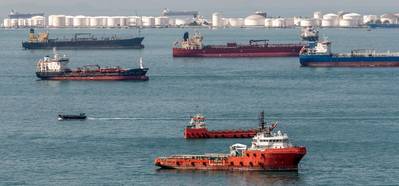China's INE Considers Singapore for Marine Fuel Futures Delivery
The Shanghai International Energy Exchange (INE) is considering using oil storage sites in Singapore owned by PetroChina Co as a delivery point for its low-sulphur fuel oil futures contract, according to two sources with direct knowledge of the matter.
The INE’s move would be the first time a Chinese futures contract would be deliverable outside of China and could boost liquidity for the contract, as well as help to influence pricing for shipping fuel.
Low-sulphur fuel oil (LSFO) is required as ship fuel to meet new maritime emissions regulations that went into effect this year. Singapore is the world’s biggest ship-fueling port.
The INE posted a notice on its website late on Tuesday seeking market feedback on allowing LSFO futures contract buyers to take deliveries outside China, but did not give a location or a start date for the change.
However, Singapore could be used as a delivery point for the LSFO contract before the end of the year, the two sources said.
“The new plan gives traders, especially those large bunker fuel players in Singapore, greater flexibility to take deliveries as they see more economic and convenient, versus say Zhoushan (in China),” said one of the sources.
PetroChina International, a unit of PetroChina, was Singapore’s top marine fuel supplier in 2019. The company owns a 25% stake in Singapore’s Universal Terminal oil storage site at Jurong Island in the island city-state’s southwest.
An INE spokesman declined to comment on the matter. PetroChina and Singapore’s Maritime Port Authority did not immediately respond to requests for comment.
The INE’s yuan-denominated LSFO contract has traded 4.9 million lots through October since it started up in June, or about 320 million barrels, the exchange said.
The INE and China aim to grow the contract, for fuel oil with a sulphur content of 0.5%, into an Asian benchmark for the ship fuel. The current benchmarks are for cargoes sold in Singapore.
(Reporting by Chen Aizhu; Editing by Christian Schmollinger)

